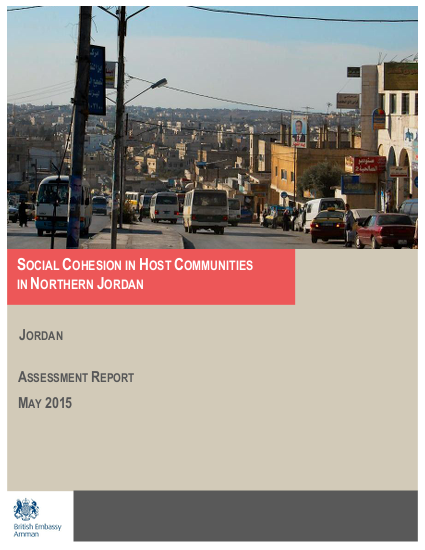Assessment Report

The vast majority of refugees from Syria in Jordan live outside of formal refugee camps in host communities, creating challenges for the Government of Jordan (GoJ) in meeting the needs of both its own citizens and the growing refugee population. With vulnerable Jordanians and Syrians increasingly competing for employment, shelter, water and other basic necessities, there is growing concern that this competition over scarce resources will lead to rising tensions and increased instability in the country.
In light of the need to better understand the factors impacting social cohesion and resilience in Jordan, REACH conducted an assessment of the challenges to social cohesion and resilience, from August 2013 to March 2014. Currently, REACH is implementing an evaluation of support provided to municipalities in northern Jordan. This follow-up assessment builds upon the previous assessment by analyzing the findings from the household baseline component of this evaluation and through exploring potential drivers of tensions in the medium to long term between host communities and the refugee population, and between community residents and local services providers.
Data collection was conducted in August and September 2014 in the northern governorates of Al Mafraq, Irbid, and Al- Zarqa. Although the evaluation explores broader satisfaction with municipal services, this report focuses on key indicators of resilience and social cohesion by analyzing the prominent changes residents have witnessed in their community, the levels of discontent with services related to these changes, and the main coping mechanisms adopted at the household level to deal with poor access to municipal services.
The aim of the research is to better understand whether prominent changes observed by community residents are linked to tensions and how this differs depending on nationality and/or municipality. This will ultimately serve to improve the planning and implementation of both regional and national response plans implemented by governments, UN agencies and NGOs.
Resource collections
- Topics
- UN Habitat - Urban Response Collection
- Urban Response - Urban Crisis Preparedness and Risk Reduction
- Urban Response Collection - Community Engagement and Social Cohesion
- Urban Response Collection - Economic Recovery
- Urban Response Collection - Environment and Climate Change
- Urban Response Collection - Housing, Land and Property
- Urban Response Collection - Urban Crisis Response, Recovery and Reconstruction
- Urban Response Collection - Urban Resilience
